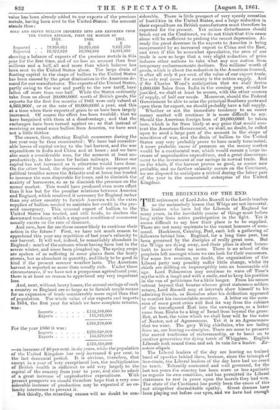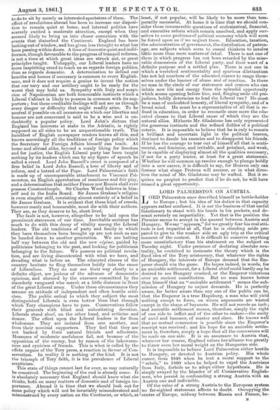THE BEGINNING OF THE END. T HE retirement of Lord John
Russell to the Lords teaches us the melancholy lesson that Whigs are not immortal_ The leaders who have led the Liberals of England for many years, in the inevitable course of things must before long retire from active participation in the fight. Yet it seems difficult to say how their place is to be supplied. There are not many aspirants to the vacant honours of com- mand. Huskisson, Canning, Peel, each left a gathering of followers behind him. England, for a long time past, has been governed by the disciples of really great men. But the -Whigs are dying away, and their place is about hence- forth to know them no more. There is no school of the prophets left amongst whom we can look for their successors. For some few sessions, no doubt, the organization of the Liberal party may possibly suffer little change, whilst its chiefs are drifting on imperceptibly into an honourable old age. Lord Palmerston may continue to wave off Time's scythe with a laugh and with a smile, and to keep his position in the van of politicians for a little longer. From his secure retreat beyond that bourne whence great statesmen seldom return, Lord Russell may at intervals show himself to his admiring friends, as Romulus after his deification appeared to comfort his inconsolable senators. A letter on the occa- sion of some great crisis will find its way from the cabinet of the transfigured Earl into the newspapers, as a letter came from Elisha to a king of Israel from beyond the grave. But, at best, the voice which we shall hear will be the voice of Nestor, not of Agamemnon. Yet it is an Agamemnon that we want. The grey Whig chieftains, who are fading from us, are leaving no disciples. There are none to preserve the sacred traditions of statesmanship, or to hand on to another generation the dying torch of Whiggisin. English Liberals look round them and ask in vain for a leader. Ex- oriare aliquis. The Liberal leaders of the day are leaving no trained band of apostles behind them, because, since the triumph of free-trade, the Liberal leaders of the day have had no creed to teach. Tolerably contented and well governed, for the last ten years the country has been more or less apathetic as regards its own condition, and has permitted its Liberal statesmen to rest in peace upon the laurels they had won. The state of the Continent has partly been the cause of this not altogether discreditable apathy. Great dramas have been playing out before our eyes, and we have bad enough to do to sit by merely as interested spectators of them. The effect of revolutions abroad has been to increase our disposi- tion to remain quiet at home, and internal politics have scarcely excited a moderate attention, except when they seemed likely to bring us into closer connexion with the events that disturbed the Continent. England has been looking out of window, and has given less thought to what has been passing within doors. A time of domestic quiet and indif- ference, though favourable to the progress of tranquil reforms, is not a time at which great ideas are struck out, or great principles taught. Unhappily, our Liberal leaders have no more inspiriting creed to teach us as regards foreign politics, than as regards domestic. A determination to defend our hearths and homes if necessary is common to every English- man, and it does not require a genius to invent the notion that our navy and our artillery ought to be ready for the worst that may befal us. Sympathy with Italy and suspi- cion of Napoleonism are both honourable instincts which a Liberal Cabinet is likely to possess in common with its sup- porters ; but these creditable feelings will not see us through every danger or difficulty that might readily arise. To be neutral if possible on all occasions on which our liberties and honour are not concerned is said to be a wise and is un- doubtedly a popular policy. Lord John's dictum that England has interests at stake in the Adriatic, is rightly supposed on all sides to be an unquestionable truth. The humblest of English newspaper readers knows all this, and knows accordingly all the traditions of foreign policy which the Secretary for Foreign Affairs himself can teach. At home and abroad alike, beyond a manly liking for freedom and for justice, the English Liberal party has been taught nothing by its leaders which can by any figure of speech be called a creed. Lord John Russell's creed is composed of a firm belief in Lord John Russell, a love of liberty and of reform, and a hatred of the Pope. Lord Palmerston's faith is made up of unconquerable attachment to Viscount Pal- inerston, an Anglish approbation of manliness and fair play, and a determination that neither France nor Russia shall ever possess Constantinople. Sir Charles Wood believes in him- self and in the India Board. Sir James Graham's religion is even simpler still, consisting almost entirely of a belief in Sir James Graham. It is evident that these kind of creeds, however manly and honourable, must die with their authors. They are, as they deserve to be, short lived. The fault is not, however, altogether to be laid upon the prominent statesmen of our time. Inevitable accident has much to do with this decay of vitality among the Liberal leaders. The old traditions of party and family in which they have themselves been brought up are not such as can be handed down to another generation. We are halting half way between the old and the new re'gime, guided by politicians belonging to the past, and looking for politicians belonging to the future. We possess no political revela- tion, and are living discontented with what we have, and dreading what is before us. The educated classes of the country hesitate to fling themselves boldly into the cause of Liberalism. They do not see their way clearly to a definite object, are jealous of the advance of democratic opinions, and alarmed by the excesses committed by the disorderly vanguard who march at a little distance in front of the great Liberal army. Under these circumstances they assume an attitude of independent and often hostile criti- cism. The public ordeal to which they subject the most distinguished Liberals is even hotter than that through which Tory champions have to pass. Conservatives follow their generals with blind and unhesitating devotion. Liberals stand aloof; on the other hand, and criticize and demur. The effect upon the Liberal leaders is far from wholesome. They are isolated from one another, and from their nominal supporters. They feel that they are not backed by their natural friends and adherents. Measures of moderate usefulness fail, not because of the opposition of the enemy, but by reason of the lukewarm- ness and cynicism of friends. This is what is called by the effete organs of the Tory press, a reaction in favour of Con- servatism. In reality it is nothing of the kind. It is not the triumph of Tory faith, it is the prevalence of Liberal scepticism.
This state of things cannot last for ever, as may naturally be conceived. The beginning of the end is already come. it is absolutely necessary that England should know what she thinks, both on many matters of domestic and of foreign im- portance. Abroad it is time that we should look out for some policy which will not be invariably misunderstood and misconstrued by every nation on the Continent, or which, at least, if not popular, will be likely to be more than tem- porarily successful. At home it is time that we should con- sider those innumerable questions of ecclesiastical, financial, and executive reform which remain unsolved, and apply our. selves to some problems of political economy which will soon be forced upon us if we neglect them. Education, taxation, the administration of government, the distribution of patron- age, are subjects which seem to casual thinkers to involve little more than mere matters of detail. There is not one of them in which progress has not been retarded by the mise- rable dissensions of the Liberal party, and their want of a definite purpose and a settled plan. There is not one in which a wretched sentimentality and spurious dilettantism has not led numbers of the educated classes to range them- selves under the banner of abuse and of reaction. Is there no man in the circle of our statesmen and orators who can inhale new life and energy from the splendid opportunity which seems opening before him, and, flinging aside old pre- judices, boldly determine to lead the Liberal van ? Ile must be a man of undoubted honesty, of liberal sympathy, and of a broad mind. He must be a representative of all that is re- fined in education in order to reconcile once more the edu- cated classes to that Liberal cause of which they are the natural allies. Hitherto Mr. Gladstone has only represented the generous instincts and the refined foibles of a political coterie. It is impossible to believe that he is only to remain a brilliant and uncertain light in the political heaven, destined to dazzle his enemies and to disappoint his friends. If he has the courage to tear out of himself all that is senti- mental, and feminine, and irritable and petulant, and weak, he is capable of displaying almost all the qualities necessary, if not for a party leader, at least for a great statesman. Whether he will summon up resolve enough to plunge boldly into a new career, it is difficult to say, for Heaven only can foresee what shape Proteus will assume, or in what direc- tion the mind of Mr. Gladstone may be wafted. But it re- quires no prophet to predict that if he do not, he will have missed a great opportunity.































 Previous page
Previous page